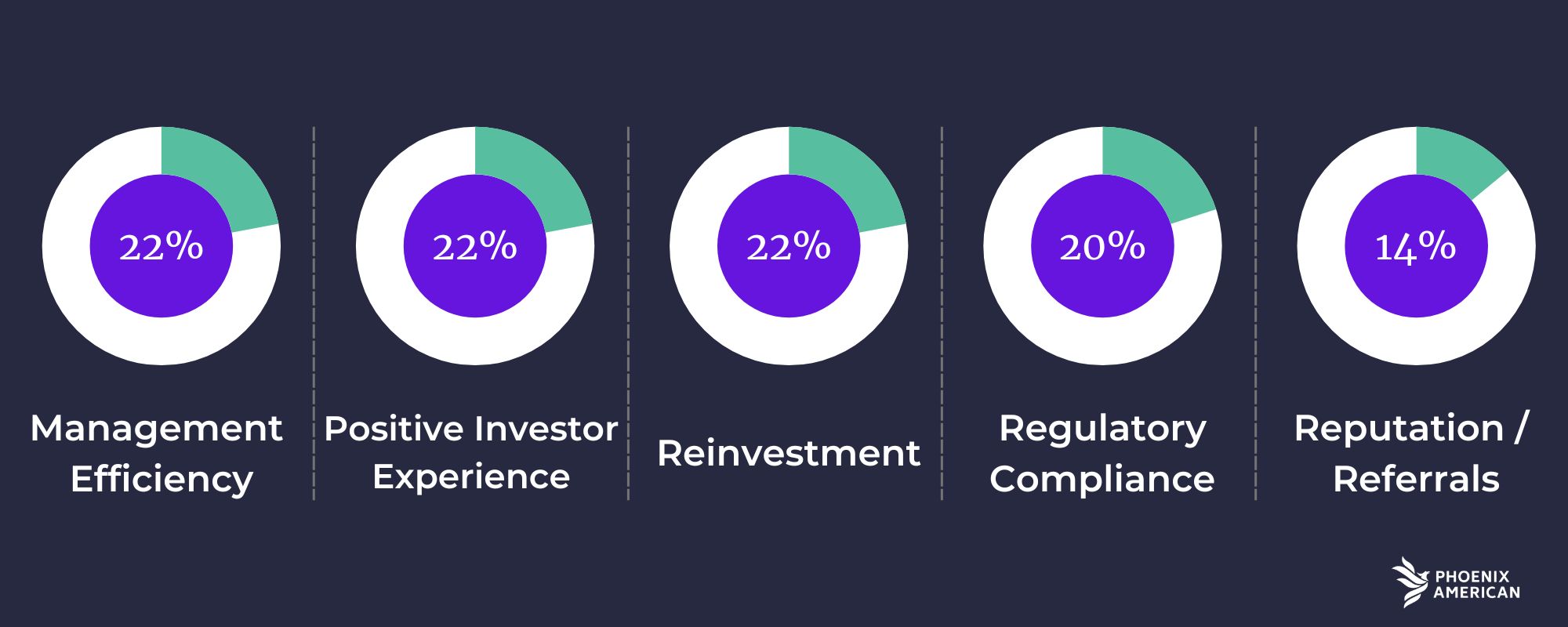Phoenix American recently surveyed alternative investment fund managers on their attitudes toward investor relations. Whether a fund sponsor manages investor relations in-house or outsources to a third-party firm, the mission of investor relations is to service the needs of the individuals and organizations that have provided the fund’s investment capital. But what, in the eyes of managers, is the primary goal? This is what the survey sought to discover. – 460 alternative fund sponsors participated in the survey.
The Question:
What is the most important goal of investor relations?
The Results
What managers consider to be the most important goal of investor relations is distributed quite evenly across the five categories. The focus for some is on fundraising. Others are concerned with easing the burden on management while others are primarily concerned with limiting business risk. It is clear that for all managers, serving investors well is important to overall success.
Management Efficiency – a clear division of labor, with fund management focusing on fundraising and asset acquisition and while experienced professionals manage investor relations, makes sense. Eliminating the distraction of investor relations from the revenue-generating activities of fund management is clearly on the minds of many fund managers.
Positive Investor Experience – managers want the performance of investor relations team to be as effective and professional as their own management of the investment portfolio. It is a matter of pride for many managers to lead an organization that is respected and appreciated by all participants. Prioritizing investor relations contributes not only to the success of the fund but the satisfaction of fund management.
Reinvestment – since current investors are the most reliable source of new investment capital, an investment in superior investor relations is money well spent. Mangers seem to appreciate that solid returns combined with a gratifying experience inspire investors to come back to invest with the same sponsor in fund after fund.
Regulatory compliance – regulatory scrutiny on the investor side is tighter than ever and to lock down compliance in investor relations eliminates a significant business risk. Managers benefit from a seamless investor experience by avoiding the disruption of inquiries from regulators.
Reputation / Referrals – although referrals trailed the pack in the survey, the potential for satisfied investors to recommend well managed and well serviced investments to others was certainly on managers’ minds. Only investors who have enjoyed a quality investor relations experience are likely to refer a friend or colleague to a given fund sponsor.
Alternative investments come in many shapes and sizes. The fundraising strategy and investor type of a particular fund will naturally influence management’s goals for investor relations and how they perceive a positive investor experience.
All investors value promptness, accuracy, consistency and a sense of appreciation in investor relations processes. However, the particular expectations of investors will vary from fund to fund. While retail investors tend to value consistency of payments, tax documents, web portal access and attention to inquiries, institutional investors expect specialized reporting, process audits and due diligence updates. The investor relations team must be able to meet investor expectations to achieve management’s goals.
While individual fund sponsors will look at the goal of investor relations through the lens of their own investor base, what all managers share is an understanding that an investment in professional investor relations pays dividends both tangible and intangible.




